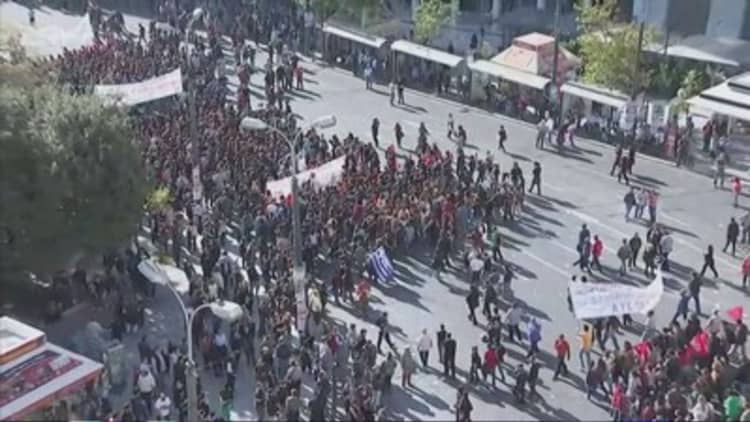
Greek police fired tear gas to disperse anti-austerity protesters hurling petrol bombs in central Athens on Thursday.
Thousands were on the streets in the Greek capital, according to Reuters, to protest against austerity measures imposed by the European Union and the International Monetary Fund (IMF). The news agency reported that flights were grounded, hospitals were running on skeleton staff and ships were docked at port.
A Reuters witness saw riot police fire tear gas at dozens of black-clad youths who broke off from the march to hurl petrol bombs and stones and smash shop windows near the parliament building. Some bombs struck the frontage of the Greek central bank and police sources said three people were detained before order was restored, according to Reuters.
It was the first nationwide strike called by Greece's main public and private sector unions since leftist Prime Minister Alexis Tsipras came to power in January.
This protest saw angry Greeks rallying against their former ally in their fight against Greece's international creditors. The country's embattled left-wing prime minister is facing his first 24-hour strike in office.
In a symbolic move to show that things had changed, one of Tsipras's first acts on becoming prime minister in January was to remove the crowd-control barriers in front of parliament designed to protect MPs from protesters. Now even his own party's workers' committee had called on members to take action and participate in Thursday's protest.
In an action-packed year for the struggling euro zone nation, it held a contentious Greek referendum, received a third 86 billion euro ($92 billion) bailout and also saw snap elections. However, further austerity measures are still required to release much-needed funds to keep the Greek economy afloat.
Still disappointing the Troika?
Earlier this week, euro zone finance ministers denied Greece a 2 billion euro payment, the first tranche of a third foreign aid package.
Even though the new Greek parliament had passed its first austerity bill, which involved stricter pension and tax evasion rules, and revoked farmers' tax breaks, the government has been reluctant to touch the more sensitive issue of home foreclosures -- a key prerequisite to release any aid.
"One of the reasons why Greeks are withstanding the crisis is that unlike other countries, like Spain, previous governments have somehow managed to protect indebted homeowners' first residences. It is ironic that Tsipras will be the first one who will have to remove that protection", Nick Malkoutzis, editor of MacroPolis, a political and economic analysis website, told CNBC.
Back in January, the coalition government of left-wing SYRIZA and the right-wing Independent Greeks' party was elected on promises of an end to austerity and an exit from the so-called memorandum of understanding, which imposed deep cuts on the Greek economy in exchange for loans. Seven months later, the coalition has been strong-armed into signing a MOU themselves.
"I don't think this is the harshest bailout package for Greece, it's just that cuts have piled up. Pensions have already been cut seven or eight times and taxes keep rising", Malkoutzis said.
Nonetheless, Greece's unions and pressure groups are up in arms.
'We owe it to our families'
"Before the elections, there were some promises to society. If the tactic of the government is 'whatever we said, holds no more', they will find the workforce in front of them. We owe it to our families, our pensioners, and the young people who are leaving Greece. We can't take this anymore. Not just the measures, but being fooled", Dimitris Karageorgopoulos, press secretary of GSEE, the largest Greek workers' union organizing Thursday's protest, told CNBC.
Other issues delaying an agreement between Greece and its creditors involve bank governance and non-performing loans. A further 10 billion euro will be disbursed for the recapitalization of Greek banks, once a deal is reached. Greek finance minister Euclid Tsakalotos told reporters after Monday's Eurogroup that an agreement was expected by early next week.
According to the latest European Commission figures, Greece will fall back to recession this year. Its economy will contract by 1.4 percent, followed by a similar contraction of 1.3 percent in 2016, only to return to growth in 2017. Until then, more austerity measures are expected and it remains to be seen whether the fragile coalition government of Tsipras will withstand the test.
—Reuters contributed to this report.


